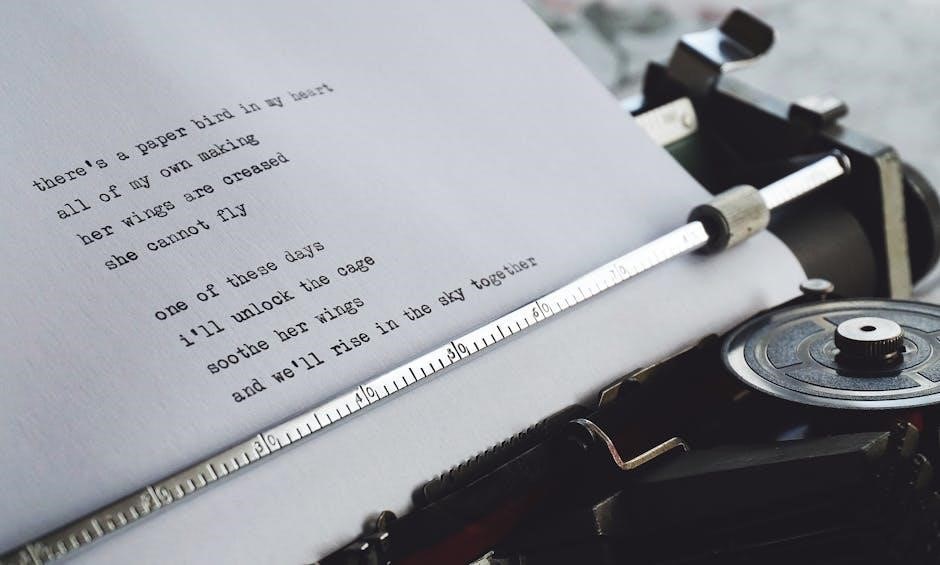Rodolfo Corky Gonzales’s I Am Joaquin (1967) is a powerful first-person narrative exploring Chicano identity, cultural heritage, and social justice. Available as a PDF, it remains a vital resource for understanding the Chicano experience and its historical significance.
Overview of the Poem’s Significance
I Am Joaquin by Rodolfo Corky Gonzales is a seminal work in Chicano literature, capturing the essence of identity, cultural heritage, and social justice. Written in 1967, the poem resonates deeply with the Chicano community, addressing generational struggles of identity and the complexities of navigating a society that often marginalizes Mexican Americans. Its significance lies in its ability to articulate the collective experiences of Chicano people, blending personal narrative with historical and cultural references. The poem’s availability in PDF format has made it accessible to scholars and readers worldwide, ensuring its enduring relevance. It remains a powerful tool for understanding the Chicano Movement and its ongoing impact on social and cultural discourse.
Historical Context of the Chicano Movement
The Chicano Movement emerged in the 1960s as a response to systemic discrimination, marginalization, and cultural erasure faced by Mexican Americans. It sought to address issues such as civil rights, education, land rights, and political representation. Rodolfo Corky Gonzales’s I Am Joaquin (1967) became a rallying cry for the movement, reflecting the struggles and aspirations of Chicano people. Written during a time of social upheaval, the poem resonated with the experiences of Chicano youth, inspiring pride in their Mexican heritage and resistance against oppression. Gonzales, a prominent activist, used the poem to voice the collective identity of Chicanos, aligning it with the broader goals of the movement, which aimed to reclaim cultural pride and fight for social justice.
Availability of the Poem in PDF Format
Rodolfo Corky Gonzales’s I Am Joaquin is widely available in PDF format, ensuring easy access for readers and scholars. This accessibility has made the poem a popular resource for educational purposes, allowing its message of identity and cultural heritage to reach a broad audience. The PDF version can be downloaded for free from various online platforms, making it convenient for those interested in exploring the Chicano experience. Additionally, study guides and analyses accompanying the PDF further enhance understanding of the poem’s historical and cultural significance. This digital availability has ensured that I Am Joaquin remains a vital and accessible work in contemporary discussions of Chicano literature and identity.

Author Background: Rodolfo Corky Gonzales
Rodolfo Corky Gonzales was a Chicano activist, poet, and former professional boxer. His 1967 poem I Am Joaquin became a cornerstone of Chicano identity and cultural pride.
Biography of Rodolfo Corky Gonzales
Rodolfo “Corky” Gonzales was a prominent Chicano activist, poet, and former professional boxer. Born in 1928 in Denver, Colorado, he became a key figure in the Chicano Civil Rights Movement. After a brief boxing career, Gonzales dedicated his life to activism, advocating for Chicano rights and cultural pride. In 1967, he published his seminal poem I Am Joaquin, which became a defining work of Chicano literature. The poem explores themes of identity, heritage, and social justice, resonating deeply with the Chicano community. Gonzales also founded the Escuela Tlatelolco, a bilingual school aimed at preserving Chicano culture. His legacy endures as a champion of education, activism, and cultural preservation.
Gonzales’s Role in the Chicano Civil Rights Movement
Rodolfo Corky Gonzales was a pivotal figure in the Chicano Civil Rights Movement, advocating for social justice and cultural empowerment. His poem I Am Joaquin became a rallying cry, inspiring Chicanos to embrace their heritage and resist oppression. Gonzales co-founded the Crusade for Justice, a Denver-based organization that fought for Chicano rights through education, activism, and community empowerment. He also played a key role in the 1960s movement, organizing protests and events that highlighted issues like discrimination and inequality. Gonzales’s leadership and writings galvanized a generation, making him a cornerstone of the Chicano Movement. His work continues to influence contemporary activism and cultural pride, solidifying his legacy as a champion of justice and identity.
His Contributions Beyond the Poem
Beyond his iconic poem, Rodolfo Corky Gonzales was a multifaceted figure who made significant contributions to Chicano culture and activism. He was a professional boxer, educator, and political organizer, using his platform to advocate for civil rights. Gonzales co-founded the Crusade for Justice, a grassroots organization dedicated to addressing issues like police brutality and educational inequality. He also established the Escuela Tlatelolco Centro de Estudios in Denver, one of the first Chicano-operated schools, emphasizing cultural pride and bilingual education. Additionally, Gonzales was a key figure in the Chicano Movement, organizing protests and events that brought attention to the struggles of Mexican Americans. His work extended far beyond literature, leaving a lasting impact on education, activism, and community empowerment.

Themes in “I Am Joaquin”
The poem explores identity struggles, blending Mexican heritage with the confusion of American society. It reflects the Chicano experience, emphasizing cultural pride and the struggle for social justice.
Identity Struggles of Chicano People
I Am Joaquin delves deeply into the identity struggles faced by Chicano people, reflecting their dual heritage and the challenges of navigating two cultures. The poem vividly portrays the internal conflict of feeling disconnected from both Mexican roots and American society, highlighting the tension between tradition and assimilation. Through Joaquin’s narrative, Gonzales captures the pain of cultural displacement and the search for self-definition. The poem resonates with themes of pride, loss, and resilience, offering a powerful exploration of what it means to be Chicano. This struggle remains a central theme in Chicano literature, making the poem a cornerstone of cultural expression and identity.

Cultural Heritage and Mexican Roots
I Am Joaquin is a deeply personal and collective exploration of Chicano cultural heritage, tracing the narrator’s roots to Aztec princes, Maya warriors, and Spanish conquistadors. The poem celebrates the richness of Mexican history and the enduring influence of indigenous and colonial legacies. Gonzales weaves historical and cultural references, creating a vivid tapestry of pride and connection to one’s ancestors. The poem emphasizes the importance of honoring Mexican roots while navigating the complexities of identity in a multicultural world. By sharing this heritage, the poem fosters a sense of unity and belonging among Chicanos, preserving their cultural legacy for future generations. Its availability in PDF format ensures this vital exploration remains accessible and widely shared.
Social Justice and Activism
I Am Joaquin serves as a powerful call to action, addressing the struggles of Chicano people against societal oppression and marginalization. The poem highlights the fight for equality, justice, and the preservation of cultural identity. Gonzales’s vivid imagery and heartfelt narrative resonate deeply, inspiring readers to confront systemic discrimination and advocate for their rights. By weaving personal and collective experiences, the poem becomes a rallying cry for social change, urging Chicanos to embrace their heritage while challenging the injustices of modern society. Its message of resilience and activism continues to inspire, making it a cornerstone of the Chicano Movement and a timeless advocate for human dignity and equality. The poem’s availability in PDF ensures its enduring impact and accessibility for future generations.

Structure and Style of the Poem
I Am Joaquin employs a free-flowing narrative style, blending vivid imagery and symbolism. The poem’s structure reflects its emotional depth, using a first-person perspective to convey personal and collective struggles effectively.

Narrative Style and First-Person Perspective
Rodolfo Corky Gonzales’s I Am Joaquin utilizes a first-person narrative style, creating an intimate and personal connection with the reader. This perspective allows Joaquin to express his internal conflicts, cultural pride, and historical struggles directly. The narrative flows through generations, weaving together experiences of identity, heritage, and resilience. By adopting this style, Gonzales personalizes the broader Chicano experience, making it relatable and impactful. The first-person voice emphasizes individuality while symbolizing collective identity, a hallmark of Chicano literature. This approach fosters empathy and understanding, drawing readers into Joaquin’s journey of self-discovery and cultural affirmation.
Use of Imagery and Symbolism
Rodolfo Corky Gonzales’s I Am Joaquin is rich in imagery and symbolism, which vividly depict the struggles and pride of the Chicano experience. The poem uses powerful symbols like the Aztec prince and the Christian Christ to represent the duality of Chicano identity, blending indigenous and colonial legacies. Imagery such as “caught up in a whirl of a gringo society” illustrates the disorienting impact of cultural assimilation. Symbols of oppression, like “scorned by attitudes” and “destroyed by modern society,” highlight systemic injustices. Conversely, imagery of Mexican roots and historical figures evokes pride and resilience. These elements create a vivid narrative that resonates emotionally, making the poem a compelling exploration of identity, heritage, and resistance.
Historical and Cultural References
Rodolfo Corky Gonzales’s I Am Joaquin is deeply rooted in historical and cultural references, tracing the Chicano experience from Aztec and Mayan roots to the Spanish conquest. The poem invokes figures like Cuauhtémoc, symbolizing resistance, and the Virgin of Guadalupe, embodying cultural spirituality. It reflects on the blending of indigenous and European traditions, highlighting the complexities of identity. Historical events, such as the Mexican Revolution, are woven into the narrative, showcasing the resilience of Chicano people. These references emphasize the rich cultural heritage and the ongoing struggle for recognition, making the poem a powerful exploration of history, identity, and collective memory.

Cultural Impact of “I Am Joaquin”
I Am Joaquin became a rallying cry for the Chicano Movement, empowering individuals to embrace their identity and heritage. Its influence extends beyond literature, shaping cultural pride and activism, while remaining a timeless piece that resonates with contemporary audiences.
Influence on Chicano Literature
Rodolfo Corky Gonzales’s I Am Joaquin is a cornerstone of Chicano literature, offering a profound exploration of identity, culture, and social justice. Its vivid imagery and symbolic language resonate deeply, making it accessible to a broad audience while preserving its historical and cultural essence.
Role in the Chicano Movement
I Am Joaquin played a pivotal role in the Chicano Movement, serving as a powerful expression of cultural identity and resistance. Gonzales’s poem became a rallying cry, inspiring Chicanos to embrace their heritage and fight for civil rights. Its themes of pride, struggle, and resilience resonated deeply, making it a cornerstone of the movement’s ideology. The poem’s emphasis on historical and cultural roots helped unify the community, fostering a sense of shared purpose. By addressing systemic oppression and celebrating Mexican ancestry, I Am Joaquin not only reflected the movement’s goals but also galvanized action, solidifying its place as a defining work of Chicano activism and literature.
Modern Relevance and Accessibility
I Am Joaquin remains a vital work in contemporary discussions of identity and social justice. Its PDF availability ensures accessibility, allowing new generations to engage with its powerful message. The poem’s themes of cultural pride and resistance continue to resonate, making it relevant in today’s conversations about identity politics and activism. Educators widely use the PDF format in classrooms, introducing students to Chicano literature and history. This accessibility has ensured that Gonzales’s work remains a cornerstone of cultural and academic discourse, inspiring ongoing reflection and dialogue about heritage and social change.

Study Guides and Analysis
I Am Joaquin study guides, including those from Gale Cengage Learning, provide in-depth analysis of themes, quotes, and historical context, aiding scholars and readers in understanding the poem’s significance.
Available Study Guides for the Poem
Several study guides are available for I Am Joaquin, offering insights into its themes, historical context, and literary significance. A notable resource is the study guide by Gale Cengage Learning, which provides detailed analysis and critical perspectives. These guides often include key quotes, summaries, and discussion questions to facilitate deeper understanding. Additionally, many academic platforms offer downloadable PDF guides that explore the poem’s cultural and social implications. Such resources are invaluable for students and scholars, enabling them to engage meaningfully with Gonzales’s work and its relevance to the Chicano Movement. These study aids enhance the learning experience by breaking down complex ideas and highlighting the poem’s enduring impact.
Key Quotes and Their Meanings
“I am Joaquin, lost in a world of confusion,” captures the essence of Chicano identity struggles, reflecting the tension between cultural heritage and societal expectations. Another powerful line, “Caught up in a whirl of a gringo society,” highlights the alienation felt by Chicanos in a dominant Anglo culture. The poem also declares, “I am Aztec prince and Christian Christ,” symbolizing the blending of indigenous and colonial legacies. These quotes encapsulate the poem’s themes of identity, cultural duality, and resilience, offering profound insights into the Chicano experience. They resonate deeply, making I Am Joaquin a cornerstone of Chicano literature and activism, continuing to inspire reflection and pride among readers today.
Analysis of the Poem’s Message
Rodolfo Corky Gonzales’s I Am Joaquin delivers a powerful exploration of Chicano identity, blending personal and collective experiences. The poem’s message revolves around the struggle to reconcile Mexican heritage with American societal pressures. Through vivid imagery and historical references, Gonzales portrays Joaquin’s journey from confusion to pride, emphasizing resilience and cultural roots. The poem critiques systemic oppression while advocating for unity and empowerment. Its emotional depth and call for self-awareness resonate deeply, making it a landmark of Chicano literature. By weaving personal narrative with broader cultural themes, I Am Joaquin remains a timeless advocate for social justice and identity affirmation, continuing to inspire reflection and action among readers today.

Legacy of Rodolfo Corky Gonzales
Rodolfo Corky Gonzales’s enduring legacy lies in his contributions to Chicano civil rights, education, and literature. His poem I Am Joaquin and activism continue to inspire future generations, celebrating identity and fostering social change.
His Other Literary Works
Beyond I Am Joaquin, Rodolfo Corky Gonzales contributed to Chicano literature through works like Memorial Day and Other Verse. His writings often reflected themes of identity, cultural pride, and social justice.
Gonzales’s poetry and essays, such as Stupid America and El Sol y La Luna, emphasized the struggles and resilience of the Chicano community. These works remain significant in understanding his activism and literary vision.
His literary legacy extends beyond poetry, influencing future generations of writers and activists. Gonzales’s ability to articulate the Chicano experience solidified his place as a pivotal figure in American literature.
Impact on Education and Activism
Rodolfo Corky Gonzales’s work profoundly influenced education and activism within the Chicano community. His poem I Am Joaquin became a cornerstone of Chicano studies, inspiring educators to incorporate diverse perspectives into curricula.
Gonzales founded the Escuela Tlatelolco, a cultural and educational center in Denver, which emphasized bilingual education and cultural pride. This institution remains a testament to his commitment to empowering future generations.
His activism extended beyond literature, as he organized protests and advocated for civil rights, further cementing his legacy as a leader in the Chicano Movement. Gonzales’s efforts continue to inspire modern educators and activists, ensuring his impact endures.
Continued Celebration of His Legacy
Rodolfo Corky Gonzales’s legacy endures through annual celebrations and tributes, including events marking his birthday and the anniversary of I Am Joaquin’s publication. These gatherings honor his contributions to Chicano culture and activism.
Google Doodles and community events highlight his influence, ensuring his message of pride and resilience reaches new generations. Gonzales’s poem remains a rallying cry, inspiring continued exploration of identity and heritage.
His family and admirers keep his memory alive, preserving his work and ideals for future leaders; Gonzales’s impact is timeless, resonating in education, art, and activism, celebrating his enduring legacy. His work continues to inspire, fostering pride and unity within the Chicano community and beyond.
I Am Joaquin remains a cornerstone of Chicano literature, its message of identity and resilience continuing to inspire. Its availability in PDF ensures timeless accessibility and relevance.
Rodolfo Corky Gonzales’s I Am Joaquin is a seminal work in Chicano literature, capturing the identity struggles and cultural pride of Mexican Americans. Written in 1967, the poem reflects the internal conflict of Chicanos navigating their Indigenous and Spanish heritage amidst dominant American culture. It became a powerful symbol of the Chicano Movement, inspiring activism and pride. The poem’s availability in PDF format has ensured its accessibility, allowing it to resonate with new generations. Its exploration of identity, heritage, and social justice continues to be a vital resource for understanding the Chicano experience, making it a cornerstone of cultural and historical significance.

Final Thoughts on Its Relevance
I Am Joaquin remains a timeless and influential work, resonating deeply with contemporary issues of identity and social justice. Its exploration of cultural heritage and the Chicano experience continues to inspire new generations. The poem’s availability in PDF format ensures its accessibility, making it a crucial educational tool. Gonzales’s powerful narrative not only reflects the past but also encourages ongoing conversations about identity, activism, and cultural pride. As a literary and historical landmark, I Am Joaquin underscores the enduring importance of self-awareness and collective empowerment, maintaining its relevance in today’s diverse and evolving world.
Call to Action for Further Reading
Engage deeply with I Am Joaquin by downloading the PDF version, which offers a convenient way to explore its profound themes. Supplement your reading with study guides and analyses to enrich your understanding of its cultural and historical significance. Dive into Gonzales’s other works and explore the broader Chicano literary tradition. Share the poem with others to spread its powerful message of identity and resilience. Embrace the opportunity to connect with a pivotal work of Chicano literature and activism. Let I Am Joaquin inspire your own journey of self-discovery and appreciation for the rich heritage it celebrates.
